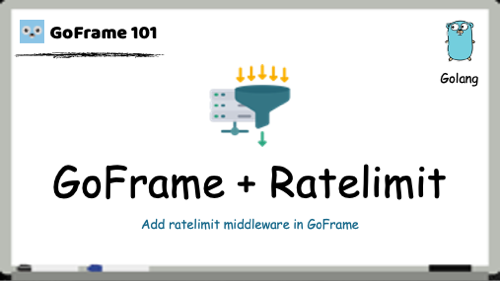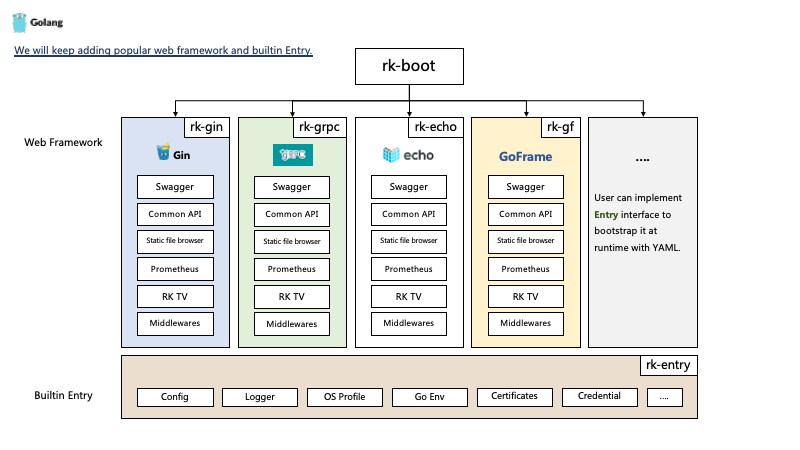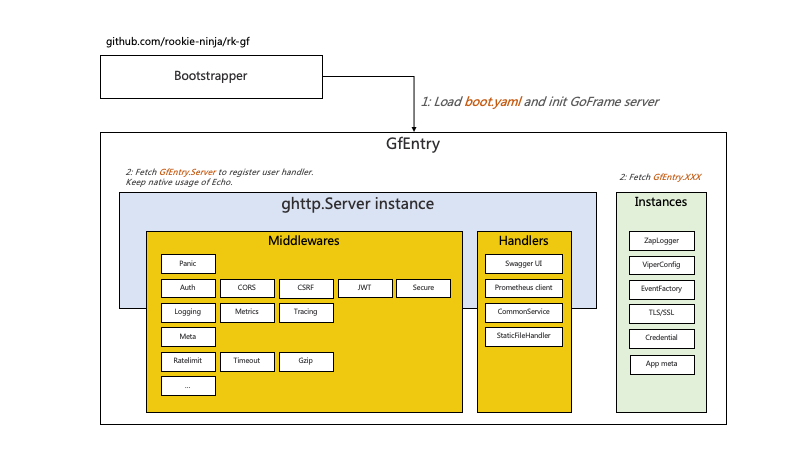
introduce
Through a complete example, in gogf/gf Implement [current limiting] Middleware in the framework.
We will use rk-boot To start gogf/gf Microservices.
rk-boot Is a framework that can start a variety of Web services through YAML. Please refer to the last chapter of this article for details rk-boot Details.
Please visit the following address for a complete tutorial: https://rkdocs.netlify.app/cn
install
go get github.com/rookie-ninja/rk-boot/gf
Quick start
1. Create boot yaml
To verify, we launched the following options:
- commonService: commonService contains a series of general API s, such as / rk / V1 / health. details
We set the current limit for / v1/greeter to 0 and other APIs to 100. We'll be in main Go implements the / v1/greeter API.
---
gf:
- name: greeter # Required
port: 8080 # Required
enabled: true # Required
commonService:
enabled: true # Optional, Enable common service for testing
interceptors:
rateLimit:
enabled: true
reqPerSec: 100
paths:
- path: "/v1/greeter"
reqPerSec: 02. Create main go
Implement the / v1/greeter API.
// Copyright (c) 2021 rookie-ninja
//
// Use of this source code is governed by an Apache-style
// license that can be found in the LICENSE file.
package main
import (
"context"
"fmt"
"github.com/gogf/gf/v2/net/ghttp"
"github.com/rookie-ninja/rk-boot"
"github.com/rookie-ninja/rk-boot/gf"
"net/http"
)
func main() {
// Create a new boot instance.
boot := rkboot.NewBoot()
// Bootstrap
boot.Bootstrap(context.Background())
// Register handler
gfEntry := rkbootgf.GetGfEntry("greeter")
gfEntry.Server.BindHandler("/v1/greeter", func(ctx *ghttp.Request) {
ctx.Response.WriteHeader(http.StatusOK)
ctx.Response.WriteJson(&GreeterResponse{
Message: fmt.Sprintf("Hello %s!", ctx.GetQuery("name")),
})
})
// Wait for shutdown sig
boot.WaitForShutdownSig(context.Background())
}
type GreeterResponse struct {
Message string
}3. Folder structure
$ tree . ├── boot.yaml ├── go.mod ├── go.sum └── main.go 0 directories, 4 files
4. Start main go
$ go run main.go
2022-01-06T16:21:51.247+0800 INFO boot/gf_entry.go:1050 Bootstrap gfEntry {"eventId": "380e2b2d-9141-49e6-82bc-fe615d659a76", "entryName": "greeter"}
------------------------------------------------------------------------
endTime=2022-01-06T16:21:51.247683+08:00
startTime=2022-01-06T16:21:51.247006+08:00
elapsedNano=677174
timezone=CST
ids={"eventId":"380e2b2d-9141-49e6-82bc-fe615d659a76"}
app={"appName":"rk","appVersion":"","entryName":"greeter","entryType":"GfEntry"}
env={"arch":"amd64","az":"*","domain":"*","hostname":"lark.local","localIP":"10.8.0.2","os":"darwin","realm":"*","region":"*"}
payloads={"commonServiceEnabled":true,"commonServicePathPrefix":"/rk/v1/","gfPort":8080}
error={}
counters={}
pairs={}
timing={}
remoteAddr=localhost
operation=Bootstrap
resCode=OK
eventStatus=Ended
EOE5. Verification
- When a request is sent to / v1/greeter, the current will be limited.
$ curl -X GET "localhost:8080/v1/greeter?name=rk-dev"
{
"error":{
"code":429,
"status":"Too Many Requests",
"message":"",
"details":[
"slow down your request"
]
}
}- Send request to / rk / V1 / health, normal
$ curl localhost:8080/rk/v1/healthy
{"healthy":true}Introduction to rk boot
rk-boot Is a framework that can start a variety of Web services through YAML.
It is similar to Spring boot. By integrating rk XXX series libraries, you can start a variety of Web frameworks. Of course, users can also customize the RK XXX library and integrate it into rk boot.

Rk boot highlights
Launch different Web frameworks through YAML files in the same format.
For example, we can start grpc, gin, echo and goframe frameworks in one process through the following files. Unify the micro service layout within the team.
- Dependent installation
go get github.com/rookie-ninja/rk-boot/grpc go get github.com/rookie-ninja/rk-boot/gin go get github.com/rookie-ninja/rk-boot/echo go get github.com/rookie-ninja/rk-boot/gf
- boot.yaml
---
grpc:
- name: grpc-server
port: 8080
enabled: true
commonService:
enabled: true
gin:
- name: gin-server
port: 8081
enabled: true
commonService:
enabled: true
echo:
- name: echo-server
port: 8082
enabled: true
commonService:
enabled: true
gf:
- name: gf-server
port: 8083
enabled: true
commonService:
enabled: true- main.go
// Copyright (c) 2021 rookie-ninja
//
// Use of this source code is governed by an Apache-style
// license that can be found in the LICENSE file.
package main
import (
"context"
"github.com/rookie-ninja/rk-boot"
_ "github.com/rookie-ninja/rk-boot/echo"
_ "github.com/rookie-ninja/rk-boot/gf"
_ "github.com/rookie-ninja/rk-boot/gin"
_ "github.com/rookie-ninja/rk-boot/grpc"
)
// Application entrance.
func main() {
// Create a new boot instance.
boot := rkboot.NewBoot()
// Bootstrap
boot.Bootstrap(context.Background())
// Wait for shutdown sig
boot.WaitForShutdownSig(context.Background())
}- verification
# gRPC throuth grpc-gateway
$ curl localhost:8080/rk/v1/healthy
{"healthy":true}
# Gin
$ curl localhost:8081/rk/v1/healthy
{"healthy":true}
# Echo
$ curl localhost:8082/rk/v1/healthy
{"healthy":true}
# GoFrame
$ curl localhost:8083/rk/v1/healthy
{"healthy":true}Web framework supported by rk boot
Welcome to contribute a new Web framework to the RK boot series.
reference resources docs & rk-gin As an example.
frame | Development status | install | rely on |
|---|---|---|---|
Stable | go get github.com/rookie-ninja/rk-boot/gin | ||
Stable | go get github.com/rookie-ninja/rk-boot/grpc | ||
Stable | go get github.com/rookie-ninja/rk-boot/echo | ||
Stable | go get github.com/rookie-ninja/rk-boot/gf | ||
Testing | go get github.com/rookie-ninja/rk-boot/fiber | ||
Testing | go get github.com/rookie-ninja/rk-boot/zero | ||
Testing | go get github.com/rookie-ninja/rk-boot/mux |
Rk GF introduction
rk-gf Used to launch via YAML gogf/gf Web services.

Supported features
According to the YAML file initialization example below, if it is external, the native usage will be maintained.
example | introduce |
|---|---|
ghttp.Server | Primordial gogf/gf |
Config | Primordial spf13/viper Parameter instance |
Logger | Primordial uber-go/zap Log instance |
EventLogger | Used to record RPC request logs, using rk-query |
Credential | Used to pull Credential from a remote service, such as ETCD |
Cert | Obtain the TLS/SSL certificate from the remote service (ETCD, etc.) and start SSL/TLS |
Prometheus | Start the Prometheus client and push it to as needed pushgateway |
Swagger | Launch Swagger UI locally |
CommonService | Expose common API s |
TV | TV web page, showing the basic information of micro services |
StaticFileHandler | Start the static file download service in the form of Web, and the background storage supports the local file system and pkger |
Supported Middleware
rk-gf will initialize the middleware according to the YAML file.
Middleware | Description |
|---|---|
Metrics | Collect RPC Metrics and start prometheus |
Log | use rk-query Record each RPC log |
Trace | Collect RPC call chain and send data to stdout, local file or jaeger open-telemetry/opentelemetry-go. |
Panic | Recover from panic for RPC requests and log it. |
Meta | Collect the service meta information and add it to the return Header |
Auth | Middleware supporting basic auth & API key authentication |
RateLimit | RPC speed limiting Middleware |
Timeout | RPC timeout Middleware |
CORS | CORS Middleware |
JWT | JWT validation |
Secure | Server side security middleware |
CSRF | CSRF Middleware |
GoFrame complete YAML configuration
---
#app:
# description: "this is description" # Optional, default: ""
# keywords: ["rk", "golang"] # Optional, default: []
# homeUrl: "http://example.com" # Optional, default: ""
# iconUrl: "http://example.com" # Optional, default: ""
# docsUrl: ["http://example.com"] # Optional, default: []
# maintainers: ["rk-dev"] # Optional, default: []
#zapLogger:
# - name: zap-logger # Required
# description: "Description of entry" # Optional
#eventLogger:
# - name: event-logger # Required
# description: "Description of entry" # Optional
#cred:
# - name: "local-cred" # Required
# provider: "localFs" # Required, etcd, consul, localFs, remoteFs are supported options
# description: "Description of entry" # Optional
# locale: "*::*::*::*" # Optional, default: *::*::*::*
# paths: # Optional
# - "example/boot/full/cred.yaml"
#cert:
# - name: "local-cert" # Required
# provider: "localFs" # Required, etcd, consul, localFs, remoteFs are supported options
# description: "Description of entry" # Optional
# locale: "*::*::*::*" # Optional, default: *::*::*::*
# serverCertPath: "example/boot/full/server.pem" # Optional, default: "", path of certificate on local FS
# serverKeyPath: "example/boot/full/server-key.pem" # Optional, default: "", path of certificate on local FS
# clientCertPath: "example/client.pem" # Optional, default: "", path of certificate on local FS
# clientKeyPath: "example/client.pem" # Optional, default: "", path of certificate on local FS
#config:
# - name: rk-main # Required
# path: "example/boot/full/config.yaml" # Required
# locale: "*::*::*::*" # Required, default: *::*::*::*
# description: "Description of entry" # Optional
gf:
- name: greeter # Required
port: 8080 # Required
enabled: true # Required
# description: "greeter server" # Optional, default: ""
# cert:
# ref: "local-cert" # Optional, default: "", reference of cert entry declared above
# sw:
# enabled: true # Optional, default: false
# path: "sw" # Optional, default: "sw"
# jsonPath: "" # Optional
# headers: ["sw:rk"] # Optional, default: []
# commonService:
# enabled: true # Optional, default: false
# static:
# enabled: true # Optional, default: false
# path: "/rk/v1/static" # Optional, default: /rk/v1/static
# sourceType: local # Required, options: pkger, local
# sourcePath: "." # Required, full path of source directory
# tv:
# enabled: true # Optional, default: false
# prom:
# enabled: true # Optional, default: false
# path: "" # Optional, default: "metrics"
# pusher:
# enabled: false # Optional, default: false
# jobName: "greeter-pusher" # Required
# remoteAddress: "localhost:9091" # Required
# basicAuth: "user:pass" # Optional, default: ""
# intervalMs: 10000 # Optional, default: 1000
# cert: # Optional
# ref: "local-test" # Optional, default: "", reference of cert entry declared above
# logger:
# zapLogger:
# ref: zap-logger # Optional, default: logger of STDOUT, reference of logger entry declared above
# eventLogger:
# ref: event-logger # Optional, default: logger of STDOUT, reference of logger entry declared above
# interceptors:
# loggingZap:
# enabled: true # Optional, default: false
# zapLoggerEncoding: "json" # Optional, default: "console"
# zapLoggerOutputPaths: ["logs/app.log"] # Optional, default: ["stdout"]
# eventLoggerEncoding: "json" # Optional, default: "console"
# eventLoggerOutputPaths: ["logs/event.log"] # Optional, default: ["stdout"]
# metricsProm:
# enabled: true # Optional, default: false
# auth:
# enabled: true # Optional, default: false
# basic:
# - "user:pass" # Optional, default: []
# ignorePrefix:
# - "/rk/v1" # Optional, default: []
# apiKey:
# - "keys" # Optional, default: []
# meta:
# enabled: true # Optional, default: false
# prefix: "rk" # Optional, default: "rk"
# tracingTelemetry:
# enabled: true # Optional, default: false
# exporter: # Optional, default will create a stdout exporter
# file:
# enabled: true # Optional, default: false
# outputPath: "logs/trace.log" # Optional, default: stdout
# jaeger:
# agent:
# enabled: false # Optional, default: false
# host: "" # Optional, default: localhost
# port: 0 # Optional, default: 6831
# collector:
# enabled: true # Optional, default: false
# endpoint: "" # Optional, default: http://localhost:14268/api/traces
# username: "" # Optional, default: ""
# password: "" # Optional, default: ""
# rateLimit:
# enabled: false # Optional, default: false
# algorithm: "leakyBucket" # Optional, default: "tokenBucket"
# reqPerSec: 100 # Optional, default: 1000000
# paths:
# - path: "/rk/v1/healthy" # Optional, default: ""
# reqPerSec: 0 # Optional, default: 1000000
# jwt:
# enabled: true # Optional, default: false
# signingKey: "my-secret" # Required
# ignorePrefix: # Optional, default: []
# - "/rk/v1/tv"
# - "/sw"
# - "/rk/v1/assets"
# signingKeys: # Optional
# - "key:value"
# signingAlgo: "" # Optional, default: "HS256"
# tokenLookup: "header:<name>" # Optional, default: "header:Authorization"
# authScheme: "Bearer" # Optional, default: "Bearer"
# secure:
# enabled: true # Optional, default: false
# xssProtection: "" # Optional, default: "1; mode=block"
# contentTypeNosniff: "" # Optional, default: nosniff
# xFrameOptions: "" # Optional, default: SAMEORIGIN
# hstsMaxAge: 0 # Optional, default: 0
# hstsExcludeSubdomains: false # Optional, default: false
# hstsPreloadEnabled: false # Optional, default: false
# contentSecurityPolicy: "" # Optional, default: ""
# cspReportOnly: false # Optional, default: false
# referrerPolicy: "" # Optional, default: ""
# ignorePrefix: [] # Optional, default: []
# csrf:
# enabled: true
# tokenLength: 32 # Optional, default: 32
# tokenLookup: "header:X-CSRF-Token" # Optional, default: "header:X-CSRF-Token"
# cookieName: "_csrf" # Optional, default: _csrf
# cookieDomain: "" # Optional, default: ""
# cookiePath: "" # Optional, default: ""
# cookieMaxAge: 86400 # Optional, default: 86400
# cookieHttpOnly: false # Optional, default: false
# cookieSameSite: "default" # Optional, default: "default", options: lax, strict, none, default
# ignorePrefix: [] # Optional, default: []